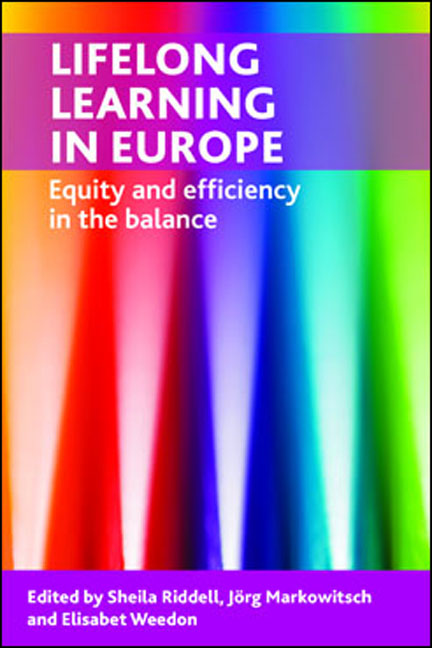Book contents
- Frontmatter
- Contents
- List of figures, tables and case studies
- Notes on contributors
- List of contributors, by country, to the EU Sixth Framework Project ‘Towards a Lifelong Learning Society in Europe: The Contribution of the Education System’ (LLL2010)
- one Lifelong learning and the generation of human and social capital
- two Lifelong learning and the wider European socioeconomic context
- three Neoliberal and inclusive themes in European lifelong learning policy
- four Formal adult education in the spotlight: profiles, motivations and experiences of participants in 12 European countries
- five The sociodemographic obstacles to participating in lifelong learning across Europe
- six The qualification-providing enterprise? Support for formal adult education in small and medium-sized enterprises
- seven Reducing or reinforcing inequality: assessing the impact of European policy on widening access to higher education
- eight Conclusion: the role of lifelong learning in reducing social inequality at a time of economic crisis
- Technical annex to Chapter Four
- Glossary of terms and abbreviations
- Index
one - Lifelong learning and the generation of human and social capital
Published online by Cambridge University Press: 01 September 2022
- Frontmatter
- Contents
- List of figures, tables and case studies
- Notes on contributors
- List of contributors, by country, to the EU Sixth Framework Project ‘Towards a Lifelong Learning Society in Europe: The Contribution of the Education System’ (LLL2010)
- one Lifelong learning and the generation of human and social capital
- two Lifelong learning and the wider European socioeconomic context
- three Neoliberal and inclusive themes in European lifelong learning policy
- four Formal adult education in the spotlight: profiles, motivations and experiences of participants in 12 European countries
- five The sociodemographic obstacles to participating in lifelong learning across Europe
- six The qualification-providing enterprise? Support for formal adult education in small and medium-sized enterprises
- seven Reducing or reinforcing inequality: assessing the impact of European policy on widening access to higher education
- eight Conclusion: the role of lifelong learning in reducing social inequality at a time of economic crisis
- Technical annex to Chapter Four
- Glossary of terms and abbreviations
- Index
Summary
Introduction
This book takes a retrospective and prospective look at the contribution of lifelong learning to economic growth and social cohesion across Europe. It draws on comparative data from the EU Sixth Framework Project ‘Towards a Lifelong Learning Society in Europe: The Contribution of the Education System’ (LLL2010), which ran from 2005 to 2011 and involved 12 European countries and Russia. The countries participating in the project allowed for contrasts to be drawn between the experiences of old member states located in Northern and Western Europe and new member states in Central and Eastern Europe. Throughout the book there is a focus on the part played by lifelong learning in challenging social exclusion, which takes very different forms in old and new member states. The Eastern European post-communist countries experienced considerable change in the early 1990s with the collapse of the Soviet Union and the transition from planned, state-regulated economies to less regulated economies and labour markets. This led to increases in unemployment and also a dismantling of existing social institutions such as child-care and adult education networks. By 2007, all the LLL2010 post-communist countries had joined the European Union (EU). This provided access to funding in a range of areas, including lifelong learning, and obligations to increase participation rates. The economy of the EU was buoyant until mid-2007, but was subsequently hit by successive waves of financial crisis that threaten the progress made in widening access to lifelong learning opportunities across Europe. At the time of writing (December 2011), the ongoing economic crisis raises fundamental questions about the political and social goals of the EU, particularly the feasibility of harmonising social and education policy across member states. While some countries, such as Germany, are arguing for greater fiscal and social integration, other countries, such as the UK, are seeking to repatriate powers from Europe, particularly in areas such as employment and training. The forward momentum of the European project is clearly faltering, raising the possibility that the high-water mark of European integration has been achieved, with implications for many aspects of education and social policy, including lifelong learning.
In this introductory chapter, we set out the broad problematic of the book, which explores how lifelong learning is understood and enacted across Europe and how this is changing over time.
- Type
- Chapter
- Information
- Lifelong Learning in EuropeEquity and Efficiency in the Balance, pp. 1 - 16Publisher: Bristol University PressPrint publication year: 2012



